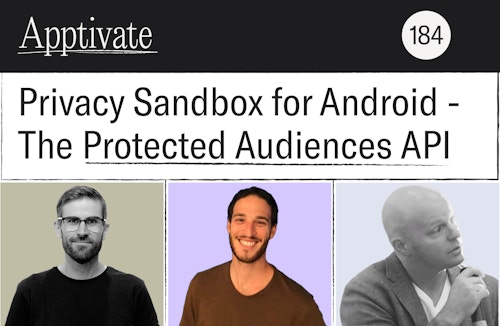Ep 184: Privacy Sandbox for Android: The Protected Audiences API
June 27, 2024

This week, we bring you an episode from Singular’s Growth Masterminds Podcast about what targeting and retargeting will look like for mobile marketers on the Android Privacy Sandbox, featuring Luckey Harpley (Remerge’s Principal Product Manager), Omri Gal (Singular’s Head of Privacy), and host John Koetsier. Learn about the initial testing and campaigns that Remerge has run with Singular’s new SDK for the Sandbox’s Protected Audiences API – and find out what to expect when the rollout takes place.
Listen and subscribe:
Questions answered in this episode:
- What is the Protected Audiences API?
- What’s the function of the protected apps signal API?
- How is this related to the Topics API?
- How will targeting work with the Privacy Sandbox?
- How will retargeting work with Privacy Sandbox?
- Tell us about Singular’s testing of the Privacy Sandbox
- How does retargeting work when user data stays on the device?
- How can app marketers prepare for this?
Timestamp:
- 1:25 What’s new with the Privacy Sandbox?
- 3:46 What is the Protected Audiences API?
- 5:15 How does the Protected Apps Signal API work?
- 6:30 Is it a better Topics API?
- 10:56 What will targeting look like with the Privacy Sandbox?
- 12:45 What will retargeting look like with the Privacy Sandbox?
- 17:20 Testing Singular’s SDK with the Privacy Sandbox
- 23:00 How retargeting can work with on-device data
- 24:20 How can mobile marketers prepare for the Privacy Sandbox?
Quotes:
(3:47-4:00) “The Protected Audiences API started off its life as an API focused on solving the retargeting problem, but it’s become a lot more than that. I think remarketing will, in the end, be a small part of it.”
(23:00-23:26) “It’s not that all information lives on the device, but rather, all the information that can track a user across apps lives on the device. So our advertisers will still be able to track with their MMP partners. They just won’t know which users are in app A, B, C – but they’ll still know what users are doing in app A – and what they’re doing in app B and C. They just won’t be able to connect them together.”





